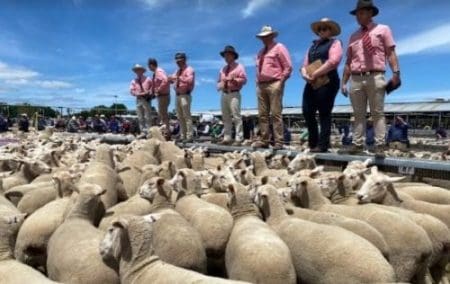
The Elders Naracoorte selling team at the first cross ewe sale.
DIVERSIFIED agribusiness service provider Elders has reported pre-tax earnings of $170.8 million and net profit of $100.8 million in its annual results for the year ended 30 September.
Pre-tax earnings were down 26pc from the previous financial year, while statutory net profit was back 38pc. The company declared a final dividend of 23c per share (30pc franked).
The strong earnings performance came despite adverse market headwinds, including softening input prices for key agricultural chemicals and fertilisers, significantly declining livestock prices, as well as inflationary pressures and rising interest rates.
Elders said its product, channel and geographical diversification was key to mitigating those headwinds, which contributed to the company’s second highest EBIT in the past ten years.
Underlying return on capital was 16pc, exceeding the target benchmark of 15pc, while operating cash flow was a net inflow of $169.2m, resulting in a cash conversion of 163pc – exceeding the target benchmark of 90pc set out in Elders’ capital management framework.
Within the company’s main divisions:
Agency Services margin decreased through the year, largely driven by declining sheep and cattle prices and reduced cattle numbers sold, partially offset by improved sheep volumes.
Real Estate Services margin declined predominantly due to rising interest rates and slowing broadacre and residential turnover. This was partially offset by increased property management, which benefited from acquisitions and ongoing rent roll growth.
Financial Services earnings improved, mostly attributable to improved performance within the Elders Insurance business (20pc Elders, 80pc QBE) and own balance sheet livestock lending. This was partially offset by the company’s Livestock in Transit (LIT) Delivery Warranty margin, which has declined in line with reduced livestock activity.
Retail Products benefited from the progression of Elders backward integration strategy through Titan AG. However, gross margin was negatively impacted by softening input prices, particularly for crop protection and fertiliser. Elders achieved volume growth across most products, which contributed to organic and market share growth in this business unit.
Wholesale Products achieved sales growth in the animal health and general merchandise portfolio, notwithstanding margin pressure in key crop protection products from falling input prices and a softening market.
Feed and Processing Services margins were adversely impacted in FY23 by the lag effect of higher cattle prices at Killara Feedlot.
Resilience in tougher operating environment

Elders managing director and chief executive officer Mark Allison.
Managing director and chief executive officer Mark Allison described Elders’ financial performance in the 2022-23 financial year as ‘resilient’.
“The year was met with challenging trading conditions and despite this, Elders achieved its second highest EBIT result in ten years,” Mr Allison said.
“This resilience was achieved due to our geographically diverse multi-product portfolio, which generated strong average earnings across the group.
“We did not compromise on financial discipline to achieve this result, with operating cash flow at a new inflow of $169m.”
Elders told shareholders it remained committed to business transformation projects which are expected to deliver short and long-term benefits, including Systems Modernisation and Elders Wool.
“The new Elders Wool business reached significant milestones with practical completion of the Ravenhall facility in Victoria and the opening of the Rockingham facility, delivering an improved level of customer service in Western Australia,” Mr Allison said.
Sustainability
Elders also released its FY23 Sustainability Report today, highlighting work throughout the year to deliver sustainability outcomes across a range of areas, including climate change, waste management, and community impact and investment.
“A highlight this year was the establishment of Thomas Elder Sustainable Farming (TESA) to improve access for farmers to technology, information and markets that help them to grow productivity while operating under more sustainable farming models,” Mr Allison said.
The company also made significant progress in its waste management activities, diverting 46,000 chemical containers from landfill and collecting 2.18 tonnes in plastic bags for recycling.
Mr Allison said the FY2023-24 year presented significant opportunities for Elders to grow and support customers through the company’s fourth Eight Point Plan.
“We expect some of the market headwinds experienced in FY23 to continue into FY24, but we are well placed to pursue opportunities for further growth and diversification. We will continue to deliver value to our customers, existing and new,” he said.
“Our priority is supporting the sustainable growth of the agriculture industry and the wellbeing of our rural communities. This means we remain focused on ensuring access to high quality products and advice that optimise efficiency and profitability, particularly in times where markets and commodities are more challenging.”

HAVE YOUR SAY